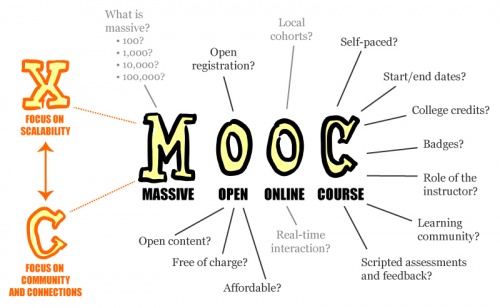Massive Open Online Courses
(Redirected from MOOCs)
A teacher sent me an email: “We do not have enough information about changes in the technology world and I appreciate what you have written on your blog. However, we are all busy with our daily lives and only has limited time. My question is: “How could we help our students with the most up to date education so they can adjust to these changes and successfully develop their needed skills?”
Answer: “Today with the Internet, people can get any information within a few seconds. My question is how many students are looking for the needed information online so they can learn something useful? And how many are busy with useless information that provides no value? The Internet can help you to learn many things but it can also consume a lot of your time on “trivial” things too. By understanding what is happening in the job market, what companies need, motivated students can plan their learning and career to take advantage of that.
I have written many articles about the Massive Open Online Courses (MOOCs). I believe MOOCs is one solution to the current educational problem. According to an industry research, in the past three years, over 25 million people from around the world have enrolled in MOOCs. However, the fact is only a small number of these millions actually completed these courses. Many took these courses out of curiosity but not serious to learn. Some took these courses then gave up because they did not have the motivation to study. But among those who completed these courses ( 86% of them from developing countries such as India and Africa countries) most reported significant benefits and having a good job afterward. The research also found that among places who participate in MOOCs, African students have completed more courses than any other countries. It prompted Facebook to develop over 500 miles of high-speed internet in Uganda and Nigeria and open a large office there to hire these talented people. Among students who completed MOOCs courses, 87% report a career benefit such as finding a job, getting a raise, and starting a new business.
My friends who teach MOOCs told me that most students who completed their courses are primary people in their 20s who want to achieve the educational needs that they could not get in their country. Beside gaining additional knowledge, they all want to update their skills to meet the job market’s needs. My friend, Professor Gershman told me that students who came from economically and academically disadvantaged know how to take advantage of MOOCs because that is their hope to get out of poverty. Many could not afford to go to college so computer programming training is the best remedy in the beginning. As they learn more and make progress, some take advantage of advanced courses and eventually be able to compete with college graduates for jobs. Today companies do not hire people with a degree but focus more on skills, especially the skills that they need. He concluded: “ MOOCs provide a life-changing opportunity for those who are less advantaged and have limited access to a good education.”
I believe that MOOCs could help solve some of the educational issues. Although some courses have a lot of students it depends on how serious and how much efforts, students will put in to learn. MOOCs cannot solve everything but only a solution to the current issues by providing access to a good education learning that some may find beneficial for furthering their education and careers.
Sources
- Blogs of Prof. John Vu, Carnegie Mellon University
